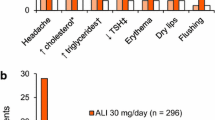Abstract
-
▴ Alitretinoin is an endogenous retinoid and acts as a pan-agonist at retinoid receptors, binding with high affinity to both retinoic acid receptors and retinoid X receptors (RXR). Oral alitretinoin once daily is approved for use in patients with severe chronic hand eczema unresponsive to treatment with potent topical corticosteroids.
-
▴ In a large (n=1032), randomized, double-blind, placebo-controlled, multicentre study (BACH) of up to 24 weeks’ duration in adults with severe chronic hand eczema, significantly more patients in the alitretinoin 10 or 30mg/day groups than in the placebo group responded to treatment with clear/ almost clear hands, as assessed by the Physician Global Assessment (PGA) [primary endpoint].
-
▴ In an extension phase of the BACH study, alitretinoin was effective in patients who relapsed after responding to initial treatment with the drug. Of patients who had responded to initial treatment with alitretinoin 30 mg/day, significantly more alitretinoin 30 mg/day than placebo recipients responded on the PGA with clear/almost clear hands during the extension phase (primary endpoint; 80% vs 8%). Of those who had responded to initial treatment with alitretinoin 10 mg/day, 48% of alitretinoin 10 mg/day and 10% of placebo recipients responded during the extension phase.
-
▴ Alitretinoin was generally well tolerated in clinical trials excluding pregnant women. The most common treatment-emergent adverse events and abnormal laboratory test results were consistent with those previously observed with other oral retinoids and RXR agonists.
Similar content being viewed by others
References
Diepgen TL, Agner T, Aberer W, et al. Management of chronic hand eczema. Contact Dermatitis 2007 Oct; 57(4): 203–10
Coenraads PJ. Hand eczema is common and multifactorial. J Invest Dermatol 2007 Jul; 127(7): 1568–70
Agner T, Andersen KE, Brandao FM, et al. Hand eczema severity and quality of life: a cross-sectional, multicentre study of hand eczema patients. Contact Dermatitis 2008 Jul; 59(1): 43–7
Hieke K, Scheidt R, Weisshaar E, et al. Societal costs of severe chronic hand eczema in Germany [abstract no. PSS29]. Value Health 2008; 11(6): A 618. Plus poster presented at the 1 1th Annual European Conference of the International Society for Pharmacoeconomics and Outcomes Research; 2008 Nov 8-11; Athens
Warshaw EM. Therapeutic options for chronic hand dermatitis. Dermatol Ther 2004; 17(3): 240–50
Schoepe S, Schacke H, May E, et al. Glucocorticoid therapy-induced skin atrophy. Exp Dermatol 2006 Jun; 15(6): 406–20
Basilea Pharmaceutica. Toctino® (alitretinoin): UK summary of product characteristics [online]. Available from URL: http://emc.medicines.org.uk/printfriendlydocument.aspx?documentid=21177&companyid=2359 [Accessed 2009 Feb 19]
Cheer SM, Foster RH. Alitretinoin. Am J Clin Dermatol 2000 Sep 31; 1(5): 307–14
Ruzicka T, Lynde CW, Jemec GB, et al. Efficacy and safety of oral alitretinoin (9-cis retinoic acid) in patients with severe chronic hand eczema refractory to topical corticosteroids: results of a randomized, double-blind, placebo-controlled, multicentre trial. Br J Dermatol 2008 Apr; 158(4): 808–17
Bollag W, Ott F. Successful treatment of chronic hand eczema with oral 9-cis-retinoic acid. Dermatology 1999; 199(4): 308–12
Gottardis MM, Lamph WW, Shalinsky DR, et al. The efficacy of 9-cis retinoic acid in experimental models of cancer. Breast Cancer Res Treat 1996; 38(1): 85–96
Heyman RA, Mangelsdorf DJ, Dyck JA, et al. 9-cis retinoic acid is a high affinity ligand for the retinoid X receptor. Cell 1992 Jan 24; 68(2): 397–406
Willy PJ, Umesono K, Ong ES, et al. LXR, a nuclear receptor that defines a distinct retinoid response pathway. Genes Dev 1995 May 1; 9(9): 1033–45
Zhang XK, Lehmann J, Hoffmann B, et al. Homodimer formation of retinoid X receptor induced by 9-cis retinoic acid. Nature 1992 Aug 13; 358(6387): 587–91
Xu J, Drew PD. 9-Cis-retinoic acid suppresses inflammatory responses of microglia and astrocytes. J Neuroimmunol 2006 Feb; 171(1-2): 135–44
Germain P, Chambon P, Eichele G, et al. International Union of Pharmacology. LXIII. Retinoid X receptors. Pharmacol Rev 2006 Dec; 58(4): 760–72
Germain P, Chambon P, Eichele G, et al. International Union of Pharmacology. LX. Retinoic acid receptors. Pharmacol Rev 2006 Dec; 58(4): 712–25
Geiger JM, Hommel L, Harms M, et al. Oral 13-cis retinoic acid is superior to 9-cis retinoic acid in sebosuppression in human beings. J Am Acad Dermatol 1996 Mar; 34(3): 513–5
Coenraads P, van der Wetering J, Roos B, et al. Pharmacokinetics, efficacy and safety of alitretinoin (9-cis retinoic acid) in moderate or severe refractory chronic hand eczema [poster no. FP1620]. 17th Annual Congress of the European Academy of Dermatology and Venereology; 2008 Sep 17–20; Paris
Schmitt-Hoffman A, Roos B, Van Lier JJ, et al. Alitretinoin (9-cis retinoic acid): mass-balance excretion study of oral alitretinoin in healthy volunteers [poster no. P289]. 16th Annual Congress of the European Academy of Dermatology and Venereology; 2007 May 16–20; Vienna
Maares J, Roos B, Kovacs P, et al. Influence of food on the pharmacokinetics of oral alitretinoin [poster no. PB. 50]. 9th Congress of the European Society of Contact Dermatitis; 2008 May 28–31; Estoril (Portugal)
Schmitt-Hoffman A, Meyer I, Weidekamm E, et al. Alitretinoin (9-cis retinoic acid): low levels in seminal fluid after repeated oral dosing [abstract no. P290]. 16th Annual Congress of the European Academy of Dermatology and Venereology; 2007 May 16–20; Vienna
Schmitt-Hoffmann A, Roos B, Baumgaertner E, et al. Alitretinoin (9-cis retinoic acid): pharmacokinetic interactions between alitretinoin, ketoconazole, simvastatin and cyclosporine A [poster no. P286]. 16th Annual Congress of the European Academy of Dermatology and Venereology; 2007 May 16–20; Vienna
Maares J, Roos B, Weidekamm E, et al. Influence of alitretinoin on pharmacokinetics of an oral contraceptive [poster no. PB.51]. 9th Congress of the European Society of Contact Dermatitis; 2008 May 28–31; Estoril (Portugal)
Ruzicka T, Larsen FG, Galewicz D, et al. Oral alitretinoin (9-cis-retinoic acid) therapy for chronic hand dermatitis in patients refractory to standard therapy: results of a randomized, double-blind, placebo-controlled, multicenter trial. Arch Dermatol 2004; 140(12): 1453–9
Coenraads P, Ruzicka T, Lynde C, et al. Alitretinoin re-induces response in relapsed CHE patients [poster no. PB.49]. 9th Congress of the European Society of Contact Dermatitis; 2008 May 28–31; Estoril (Portugal)
Ruzicka T. The next step in severe chronic hand eczema? Alitretinoin phase III results [oral presentation]. 16th Annual Congress of the European Academy of Dermatology and Venereology; 2007 May 16–20; Vienna
Elsner P. Dose-dependent time to response with oral alitretinoin in severe CHE [oral presentation]. 8th Congress of the European Society of Contact Dermatitis; 2006 Sep 13–16; Berlin
Ruzicka T. Alitretinoin induces complete response and can re-induce response in patients with severe CHE [oral presentation]. 17th Annual Congress of the European Academy of Dermatology and Venereology; 2008 Sep 17–20; Paris
Author information
Authors and Affiliations
Corresponding author
Rights and permissions
About this article
Cite this article
Garnock-Jones, K.P., Perry, C.M. Alitretinoin. Drugs 69, 1625–1634 (2009). https://doi.org/10.2165/11202200-000000000-00000
Published:
Issue Date:
DOI: https://doi.org/10.2165/11202200-000000000-00000




